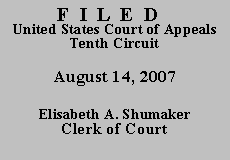

| MARTEL WHITE, |
|
| v. | |
| GARY GOLDER, Warden, Sterling Correctional Facility; C. SOARS, Administrative Head or Designee; MICHELE LAPORTE, Hearing Chairperson; JASON ZWIM, Lt.; TIMOTHY MCGILL, Lt., |
We review a district court's dismissal under § 1915(e)(2)(B) for abuse of discretion. McWilliams v. Colorado, 121 F.3d 573, 57475 (10th Cir. 1997). In accordance with § 1915(e)(2)(B), we are required to dismiss an in forma pauperis appeal if we determine that it is frivolous. This Court has held that an appeal is frivolous if it "lacks an arguable basis in either law or fact." Thompson v. Gibson, 289 F.3d 1218, 1222 (10th Cir. 2002). Because Mr. White is proceeding pro se, we construe his complaint liberally. Perkins v. Kan. Dep't of Corr., 165 F.3d 803, 806 (10th Cir. 1999).
Mr. White argues on appeal that his due process rights were violated because he was not given notice of the potential penalties before his hearing. He did not present this claim in district court. Federal appellate courts will rarely consider issues not raised in the district court. See Singleton v. Wulff, 428 U.S. 106, 120 (1976); Lyons v. Jefferson Bank & Trust, 994 F.2d 716, 72021 (10th Cir. 1993). Mr. White has not set forth any "special circumstance" that requires us to review this issue despite lack of preservation below. United States v. Windrix, 405 F.3d 1146, 1156 (10th Cir. 2005).
In any event, notice of potential penalties is not one of the requirements of due process. In Wolff v. McDonnell, 418 U.S. 539 (1974), the Supreme Court held that due process requires that a prisoner facing a disciplinary hearing be provided advance written notice of the charges, "the opportunity 'to call witnesses and present documentary evidence in his defense,'" and "a 'written statement of the factfinders as to the evidence relied on and the reasons' for the disciplinary action." Smith v. Maschner, 899 F.2d 940, 946 (10th Cir. 1990) (quoting Wolff, 418 U.S. at 56366). Mr. White does not claim that he was denied any of the rights articulated in Wolff. Indeed, the record shows that he was given notice of the hearing, the opportunity to defend himself, and a written statement of the evidence the factfinder relied on. Therefore, his due process claim was properly dismissed.
Mr. White also asserts a violation of the Equal Protection Clause. We have reviewed the district court's opinion dismissing this claim and find its reasoning and conclusions correct. To prevail on an equal protection claim, a plaintiff must show that the government has treated him differently than others who are similarly situated. See Penrod v. Zavaras, 94 F.3d 1399, 1406 (10th Cir. 1996). As part of his punishment for fighting, Mr. White was ordered to pay restitution of $410.20, half of the medical costs associated with his fight. He claims the restitution order violates his equal protection rights because other inmates are not ordered to pay restitution. Because Mr. White does not claim that this treatment resulted from a suspect classification, his punishment complies with the equal protection of the laws so long as it is rationally related to a legitimate government interest. See Templeman v. Gunter, 16 F.3d 367, 371 (10th Cir. 1994). Mr. White has not presented any evidence to prove that the distinction between himself and others "was not reasonably related to some legitimate penological purpose." Id. Therefore, we affirm the dismissal of this claim.
The appeal is DISMISSED. This dismissal counts as a strike under 28 U.S.C. § 1915(g). Appellant's motion to proceed in forma pauperis is also DENIED. Plaintiff is reminded that he is obligated to make partial payments to this court until the entire appellate filing fee is paid in accordance with 28 U.S.C. § 1915(b).
Entered for the Court,
Michael W. McConnell
Circuit Judge
*.After examining the briefs and appellate record, this panel has determined unanimously that oral argument would not materially assist in the determination of this appeal. See Fed. R. App. P. 34(a)(2); 10th Cir. R. 34.1(G). This case is therefore submitted without oral argument. This order and judgment is not binding precedent, except under the doctrines of law of the case, res judicata, and collateral estoppel. It may be cited, however, for its persuasive value consistent with Fed. R. App. P. 32.1 and 10th Cir. R. 32.1.